The Voice of the Mason Contractor: A Portrait of MCAA
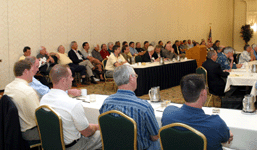 Fifty-five years ago, the Mason Contractors Association of America (MCAA) was formed to represent mason contractors at the national level. The concept was clear: mason contractors needed a driving force to secure positive outcomes with legislation, negotiate with the unions, and pave the way for a better tomorrow.
Fifty-five years ago, the Mason Contractors Association of America (MCAA) was formed to represent mason contractors at the national level. The concept was clear: mason contractors needed a driving force to secure positive outcomes with legislation, negotiate with the unions, and pave the way for a better tomorrow.
"Although we still have international agreements and we deal specifically with the laborers' union ? who we have a very close working relationship with ? our focus is completely different," says Michael Adelizzi, Executive Director of MCAA. "Our focus is now on promoting and advocating the use of masonry materials, products and masonry systems, and regulatory issues."
While the industry has changed over the years, MCAA has taken a proactive stance across the board in protecting mason contractors and their businesses.
A Changing Industry
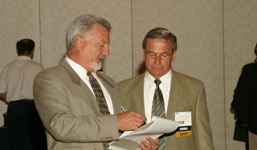 "Within the industry, we've seen a change in the last 20 years from a majority of union work to a majority of non-union work being done," says Adelizzi. "That obviously changes the complexity of the industry. It creates training, recruitment and pricing issues. Non-union business owners are generally more independent than union contractors are, in terms of standing behind an industry organization collectively to change things. Union contractors, obviously, are a little more organized, they're used to working together.
"Within the industry, we've seen a change in the last 20 years from a majority of union work to a majority of non-union work being done," says Adelizzi. "That obviously changes the complexity of the industry. It creates training, recruitment and pricing issues. Non-union business owners are generally more independent than union contractors are, in terms of standing behind an industry organization collectively to change things. Union contractors, obviously, are a little more organized, they're used to working together.
"I think the bigger change to the industry is the loss of markets. We have lost a lot of markets to competitive systems."
Adelizzi states that most mason contractors have remained relatively busy over the years, but this hid the fact that tilt-up, pre-cast and other competitors have collectively stepped in to steal away schools and other jobs that were traditionally masonry projects. This changing focus toward non-masonry building systems has created a need for an even stronger national masonry association.
"I think what has changed in MCAA is we saw a need for our organization to step up and try to lead the industry," Adelizzi says. "What MCAA's board has focused on for the last 10 years is that the contractor is the ultimate responsible person. It's their name at the bottom of a job contract to build a building. If there's a problem, the mason contractor is the first person they come to. They don't go to the unions, the manufacturers or suppliers."
Industry Leaders
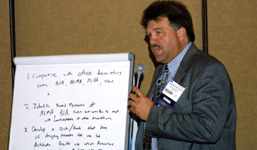 "We have striven to become leaders in our industry, and there's a reason for that," says Mackie Bounds, MCAA Treasurer and Owner of Brazos Masonry in Waco, Texas. "Our industry has become so divided. Within the masonry industry, we have the brick industry, the block industry and the stone industry. Each one of those is promoting their product ? and can I fault them for it? No, not really ? but also, yes, I can.
"We have striven to become leaders in our industry, and there's a reason for that," says Mackie Bounds, MCAA Treasurer and Owner of Brazos Masonry in Waco, Texas. "Our industry has become so divided. Within the masonry industry, we have the brick industry, the block industry and the stone industry. Each one of those is promoting their product ? and can I fault them for it? No, not really ? but also, yes, I can.
"The contractor and MCAA has become the leader to bring these fragmented industries together. And we are the right people to do that. We're the ones who are installing the products, and we're the ones wanting to sell wall systems, not just a material. MCAA has played a vital role in bringing that about."
While the work has just begun, Bounds feels that, if mason contractors are able to come together and speak with one unified voice, the only eventual outcome is for masonry to once again rule the construction market.
"We will be the number one force of the construction industry because we've got the best product," continues Bounds. "The product is long-lasting, durable, low maintenance, and for the price, you can't beat it. But what our problem is, the projects are being designed mainly with brick but no block backup. Or it gets designed with interior block walls but metal skin.
"What association is going to bring all of this together? Will the block people invite the brick people? Most likely not. Or what about the brick people inviting the stone people? No. There's only one group that's really interested in bringing our whole industry together, and that's MCAA."
Mark Kemp, Chair of the Silica Task Force and Owner of Superior Masonry Builders in Butler, Wis., takes it a step further.
"I believe in order to survive as a mason contractor, I have to be represented by someone who represents the masonry industry," says Kemp. "The spokesman for the masonry industry can only be MCAA. MCAA represents the whole masonry industry, union and non-union. While I am a union contractor, I have the same challenges as non-union contractors. It is imperative we put our differences aside for the benefit of uniting the masonry industry. MCAA is Superior Masonry's silent partner."
G. Alan Griffin, President of MCAA, says, "I think that being a member has so many advantages because the MCAA is working for mason contractors everyday, whether it is fighting for us as business owners in Washington, making sure standards and regulations are realistic, or promoting our industry."
Promotion
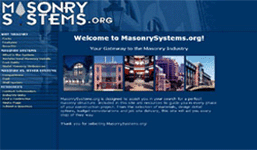 One of the many ways that MCAA has been a leader is through marketing the masonry industry. From the joint introduction of the new MasonrySystems.org web site and the co-location of Masonry Showcase with the Construction Specifiers Institute's Construct America, to even the OSHA Alliance signed in early 2004, MCAA has taken the steps to put masonry in front of architects, specifiers and other construction clients.
One of the many ways that MCAA has been a leader is through marketing the masonry industry. From the joint introduction of the new MasonrySystems.org web site and the co-location of Masonry Showcase with the Construction Specifiers Institute's Construct America, to even the OSHA Alliance signed in early 2004, MCAA has taken the steps to put masonry in front of architects, specifiers and other construction clients.
"The masonry industry has faced a number of hurdles in regards to competitive systems such as tilt-up, precast, EIFS and steel," states Colin Faul, MCAA's Director of Marketing. "In response to these groups, MCAA has had to defend the advantages of masonry over other systems, building upon masonry's time-tested durability, low maintenance, cost savings from using load-bearing design, acoustics, energy savings, fire resistance, mold resistance and even speed of construction."
"I do feel that MCAA has made an impact on the industry," says Frank Campitelli, MCAA Vice President and Owner of Baltimore Masonry, Inc., in Eldersburg, Md. "I feel that the web site and Masonry magazine articles have a positive influence. MCAA is playing a major role in advancing the MasonrySystems.org promotional campaign so that architects, specifiers and others can select, design and build with masonry systems. The Association web site is driving to be the most extensive site within the industry. Each week new information and resources are offered, and we're receiving more than 15,000 hits each day."
MCAA has not only relied on passive marketing opportunities, but has actively sought out clients and shown through actions how and why masonry should be a part of their next project.
"Marketing initiatives including Fastest Trowel, International Skills Challenge, Excellence in Masonry and our new Masonry: It Makes a Village competitions are exclusive promotional events tailored to directly market masonry products and services to architects and specifers," Faul adds. "Our new partnership with Construct America will also play a large role in influencing masonry clients. This event will provide an outlet for our members and suppliers to grab the attention of architects and specifers to show them everything masonry has to offer, including creative products and uses of masonry that architects and specifers may not have been aware of previously."
Legislative
 The global market is an ever-changing scenario, and politics is becoming an even greater part of daily business life in the masonry industry.
The global market is an ever-changing scenario, and politics is becoming an even greater part of daily business life in the masonry industry.
"From a legislative standpoint, every bill that our Congress passes or fails to pass concerning construction affects the bottom line of our profit and loss statements," says Bounds. "I firmly believe that this part of MCAA's efforts brings more to the mason contractor than any other single thing we do."
David Gillick, Executive Director of the Mason Contractors Association of St. Louis, agrees that mason contractors need to pay attention to what's going on in Washington.
"If you're in business, you certainly don't have to like politics but you have to be involved in it. That's a big thing with the MCAA and Marian Marshall, MCAA's Director of Government Affairs."
MCAA and Marshall's proactive approach in Washington have prevented several OSHA standards and legislative initiatives that could have literally wiped out masonry businesses with a stroke of a pen.
"With respect to the silica standard, because MCAA knew about the proposal early on and decided it was necessary to take a proactive approach to it, I believe the industry will be much better off in the end," says Marshall. "We should be able to fend off some of the worst possible aspects of any standard governing employee exposures to silica."
One such way that MCAA has taken a proactive lead is by having a MCAA member chair the Construction Industry Silica Task Force, which includes several other national contractors' associations.
"The Silica Task Force gives MCAA added creditability as the industry watch dog for the masonry industry and its mason contractor members," says Kemp. "The task force has been able to head off a new OSHA program before it got started. The OSHA program would have dealt the masonry industry and mason contractors a tremendous blow. It would have driven up our cost at a time when our industry is already losing market share. As an industry we can not afford this, and that is why it was so important for the Silica Task Force, led by MCAA, to step up and take charge."
The same can be said for many other construction issues, including scaffolding issues, pending hexavalent chromium and hearing conservation OSHA standards, Associated Health Plans, and the successful Political Action Committee. MCAA's proactive measures have meant the difference between business as usual or not at all.
"I think in the past, our Association, along with others, was very reactive," states Adelizzi. "If something happened we just tried to respond. I think now, our focus as an association is more about what's coming down the road that maybe hasn't hit yet but might impact our industry. We will put Association resources toward those issues to try to change their outcomes for the good of our members and the industry."
Technical
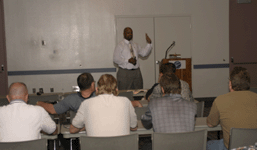 Similarly, MCAA has also been very proactive on technical issues that affect mason contractors and their businesses.
Similarly, MCAA has also been very proactive on technical issues that affect mason contractors and their businesses.
"There are changes to the masonry codes that are being proposed that, if passed, will make building with masonry more costly, thereby making masonry less competitive with other materials," says Campitelli. "MCAA is on top of this and has taken action against these proposals."
Rashod Johnson, MCAA's Director of Engineering, states that there have been many technical victories over the years for MCAA and mason contractors: from the MCAA-led initiative to cut concrete block using a wet method in the Masonry Standards Joint Committee specification (ACI 530.1), to supporting the raising of low-lift grout height requirements, increased use of brick veneer in seismic areas, and continuing preservation of empirical design.
"In a mere four years, the MCAA has grown from very little participation in technical arenas to becoming a leader in masonry codes and standards development," says Johnson. "MCAA, through the Director of Engineering position, has given a needed contractor perspective to the masonry technical community that has been lacking throughout the years. In too many cases, the academic and design community develops these codes and standards without the thought of how it will be constructed. When they do think about how the design will be constructed, they are often so far removed from the construction process that they are unrealistic about what can really be achieved in the field. The ability to influence masonry design codes, standards and regulations to become more 'constructible' is invaluable to contractors."
Johnson says that MCAA has also made strides with the highly political American Society for Testing and Materials (ASTM).
"The MCAA has positioned itself to influence the key decision-makers and also taken key leadership roles within the organization," he says. "This ensures not only are contractors not left out of the loop, but can also help steer the direction of many of the ASTM Standards that affect the installation of masonry units. For instance, when the workmanship standard is completed, it will serve as a tool by which masonry can be judged that is achievable and realistic rather than perfect and unrealistic. Many other ASTM Standards have been blocked by MCAA that, if published, would have certainly worked against contractors."
Workforce Development
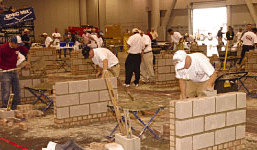 There's no point in building up market share if you don't have any masons to work for you. That's why MCAA is creating avenues for younger people to discover the benefits of joining the masonry industry.
There's no point in building up market share if you don't have any masons to work for you. That's why MCAA is creating avenues for younger people to discover the benefits of joining the masonry industry.
"The reason I joined the Workforce Development Committee was the lack of good availability of good employees in our industry," says Doug Nichols, Chair of that committee and Owner of Doug Nichols Masonry in St. Peters, Mo. "We look for ways of helping the local contractor get a good group of available employees for the future."
Nichols says that the Committee has accomplished many key things over the years to help increase the potential workforce. By increasing the amount of quality training materials, providing Spanish versions, creating National Masonry Career Days, partnering with SkillsUSA, and offering the annual Masonry Skills Challenge competition, MCAA has opened doors to the workforce of tomorrow.
"I think the ability of the Association to distribute career information to over 600 schools nationwide and to students who had no prior knowledge of masonry is our most significant accomplishment," states Melissa Polivka, MCAA's Director of Workforce Development. "Our 'Check Out a Career in Masonry' high school recruitment campaign has been much more successful than we could have imagined at its inception. With the success of this program, we are laying a foundation of future employees for our contractors, and recruiting bright young people who previously may not have thought about masonry for their careers."
Better Business
 While MCAA is taking steps to better the industry, the Association also helps to make mason contractors' businesses better on an individual level.
While MCAA is taking steps to better the industry, the Association also helps to make mason contractors' businesses better on an individual level.
"A lot of tradesmen are the best tradesmen out there," says Gillick. "They know brickwork, they do quality work, they know how to do it efficiently, they know how to be productive. However, that doesn't make you a good business person. That's where the Association will come in to help you. You can be the best bricklayer in the world but if you don't know how to run a business, you're not going to be successful."
Bounds opened his business doors on March 21, 1989, and the very next day he became a member of the Association.
"I felt like I needed the resources that were available through the MCAA," says Bounds. "Now I'd been in the masonry industry for quite some time, but not as an owner. I needed those resources to manage my business and grow my business."
The Sky's the Limit
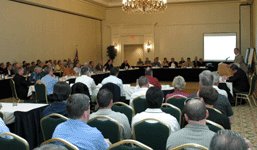 There are approximately 17,000 mason contractors in the United States ? only about 1,000 are members. What would happen if half of the mason contractors in the country were to join MCAA?
There are approximately 17,000 mason contractors in the United States ? only about 1,000 are members. What would happen if half of the mason contractors in the country were to join MCAA?
"We would reclaim our market share in the construction industry, no doubt in my mind," Bounds states. "Our prices would be able to increase. Our manpower situation would be history, and once again we would be the elite in the construction industry."
"If MCAA were able to pick up half of the contractors in the U.S., we would not only have the financial resources to tackle the issues faced by our industry, but we would have the backing of a larger member influence," says Faul. "This would give MCAA more leverage to push forward with our initiatives and fight for the survival and growth of our contractors and our industry's needs."
If you are a mason contractor and not a member of MCAA, you are not building your business up to its fullest potential. Every mason contractor can make a difference in this industry by joining MCAA, and MCAA can certainly make a difference in your business.
"I think if mason contractors would just join together, the influence we would have on promoting our industry would just be incredible," Griffin says.
"Bottom line, our greatest successes are yet to come," says Adelizzi.
About the Author
Jennie Farnsworth is an Atlanta-based freelance writer and editor. She is a former editor of Masonry magazine.


















